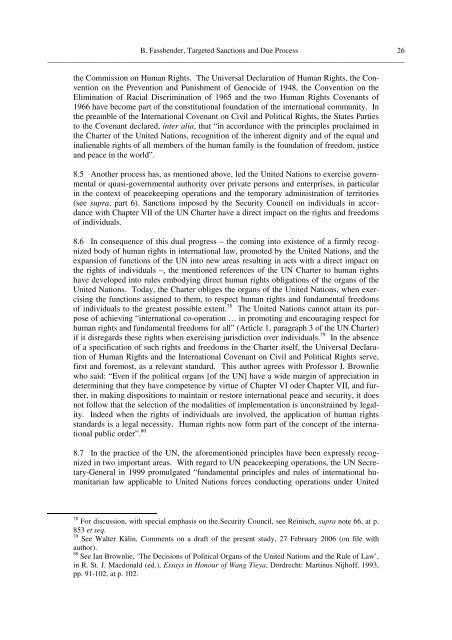Targeted Sanctions and Due Process - United Nations Treaty ...
Targeted Sanctions and Due Process - United Nations Treaty ...
Targeted Sanctions and Due Process - United Nations Treaty ...
You also want an ePaper? Increase the reach of your titles
YUMPU automatically turns print PDFs into web optimized ePapers that Google loves.
B. Fassbender, <strong>Targeted</strong> <strong>Sanctions</strong> <strong>and</strong> <strong>Due</strong> <strong>Process</strong><br />
26<br />
______________________________________________________________________________________________<br />
the Commission on Human Rights. The Universal Declaration of Human Rights, the Convention<br />
on the Prevention <strong>and</strong> Punishment of Genocide of 1948, the Convention on the<br />
Elimination of Racial Discrimination of 1965 <strong>and</strong> the two Human Rights Covenants of<br />
1966 have become part of the constitutional foundation of the international community. In<br />
the preamble of the International Covenant on Civil <strong>and</strong> Political Rights, the States Parties<br />
to the Covenant declared, inter alia, that “in accordance with the principles proclaimed in<br />
the Charter of the <strong>United</strong> <strong>Nations</strong>, recognition of the inherent dignity <strong>and</strong> of the equal <strong>and</strong><br />
inalienable rights of all members of the human family is the foundation of freedom, justice<br />
<strong>and</strong> peace in the world”.<br />
8.5 Another process has, as mentioned above, led the <strong>United</strong> <strong>Nations</strong> to exercise governmental<br />
or quasi-governmental authority over private persons <strong>and</strong> enterprises, in particular<br />
in the context of peacekeeping operations <strong>and</strong> the temporary administration of territories<br />
(see supra, part 6). <strong>Sanctions</strong> imposed by the Security Council on individuals in accordance<br />
with Chapter VII of the UN Charter have a direct impact on the rights <strong>and</strong> freedoms<br />
of individuals.<br />
8.6 In consequence of this dual progress – the coming into existence of a firmly recognized<br />
body of human rights in international law, promoted by the <strong>United</strong> <strong>Nations</strong>, <strong>and</strong> the<br />
expansion of functions of the UN into new areas resulting in acts with a direct impact on<br />
the rights of individuals –, the mentioned references of the UN Charter to human rights<br />
have developed into rules embodying direct human rights obligations of the organs of the<br />
<strong>United</strong> <strong>Nations</strong>. Today, the Charter obliges the organs of the <strong>United</strong> <strong>Nations</strong>, when exercising<br />
the functions assigned to them, to respect human rights <strong>and</strong> fundamental freedoms<br />
of individuals to the greatest possible extent. 78 The <strong>United</strong> <strong>Nations</strong> cannot attain its purpose<br />
of achieving “international co-operation … in promoting <strong>and</strong> encouraging respect for<br />
human rights <strong>and</strong> fundamental freedoms for all” (Article 1, paragraph 3 of the UN Charter)<br />
if it disregards these rights when exercising jurisdiction over individuals. 79 In the absence<br />
of a specification of such rights <strong>and</strong> freedoms in the Charter itself, the Universal Declaration<br />
of Human Rights <strong>and</strong> the International Covenant on Civil <strong>and</strong> Political Rights serve,<br />
first <strong>and</strong> foremost, as a relevant st<strong>and</strong>ard. This author agrees with Professor I. Brownlie<br />
who said: “Even if the political organs [of the UN] have a wide margin of appreciation in<br />
determining that they have competence by virtue of Chapter VI oder Chapter VII, <strong>and</strong> further,<br />
in making dispositions to maintain or restore international peace <strong>and</strong> security, it does<br />
not follow that the selection of the modalities of implementation is unconstrained by legality.<br />
Indeed when the rights of individuals are involved, the application of human rights<br />
st<strong>and</strong>ards is a legal necessity. Human rights now form part of the concept of the international<br />
public order”. 80<br />
8.7 In the practice of the UN, the aforementioned principles have been expressly recognized<br />
in two important areas. With regard to UN peacekeeping operations, the UN Secretary-General<br />
in 1999 promulgated “fundamental principles <strong>and</strong> rules of international humanitarian<br />
law applicable to <strong>United</strong> <strong>Nations</strong> forces conducting operations under <strong>United</strong><br />
78 For discussion, with special emphasis on the Security Council, see Reinisch, supra note 66, at p.<br />
853 et seq.<br />
79 See Walter Kälin, Comments on a draft of the present study, 27 February 2006 (on file with<br />
author).<br />
80 See Ian Brownlie, ‘The Decisions of Political Organs of the <strong>United</strong> <strong>Nations</strong> <strong>and</strong> the Rule of Law’,<br />
in R. St. J. Macdonald (ed.), Essays in Honour of Wang Tieya, Dordrecht: Martinus Nijhoff, 1993,<br />
pp. 91-102, at p. 102.
















